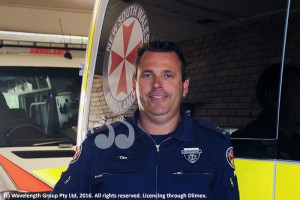Less Horses, More Sharks
TIM McEwan and his family have mixed emotions about leaving Scone after calling it home for more than 13 years and moving to Yamba.
Tim,, station office at Scone for NSW Ambulance, said the genuine appreciation the community has shown towards him has had a huge impact on them.
“The whole community has got your back and they value everything you do, every time you put on that uniform, every time you drive that ambulance, they just value what you do,” he said.
When Tim and his wife Amanda moved to Scone with their 18month old baby Zac, they wanted to raise their family in a small town with all of the benefits they had known growing up in a small town themselves.
Tim wanted to do his job and serve the local community well, but he didn’t expect becoming part of such a close community.
“I have been genuinely humbled by people’s response when I have told them I am leaving,” said Mr McEwan.
“It has been amazing to work in a small town that is genuinely concerned about what we deal with and genuinely care,” he said.
“They are genuinely interested in what you do, not from any morbid fascination or a gossipy point of view, they just genuinely care for one another,” he said.
“When I have worked for days and days straight, I don’t even have to ask, someone will mow my lawn and I never anticipated people would be so supportive when we first moved here,” Tim McEwan said.
What has been the most difficult aspect of your job?
“Having to deal with people I know and having to watch their families in the aftermath,” said Tim.
“It’s not like you do the job and it is over you are living with the consequences of the jobs for days, weeks, months, years, but that is where the community support has been a positive thing.
“And even when there has not been a great outcome, when you see their families down the street, they are still genuinely grateful for all that we did,” he said.
What has been the best aspect of your job?
“Being able to face people every day that you have helped, you’ve helped them or you’ve helped your family and just seeing the gratitude they express every time that they see you that’s inherently rewarding,” he said.
“And often in our job it is immediately in inherently rewarding when you can see you have taken the pain away for a patient, resuscitated them, or been able to make them feel more comfortable.
“But putting to one side the drugs and the intervention, usually people remember how you made them feel and that is really important too,” said Tim.
What changes have you seen in the ambulance service during those 13 years?
“There have been massive changes; the type of work hasn’t changed, but our clinical scope has changed.
“There have been some really big clinical advancements in ambulance so now we are bringing more of what was done in the emergency department to your lounge room, to the curb side or to the shopping centre.
“We’ve gone from being a car with a stretcher to being a mobile health service,” he said.
“The beauty is a lot of these things have been trialled here in the Hunter before they have been rolled out across the rest of the state or the rest of the country,” he said.
“Part of it is that the organisation has faith in us as clinicians and another part is the geography because we are far enough away from the John Hunter, Tamworth and Maitland to be able to do these meaningful interventions and see the benefits,” said Tim.
Many health care professionals would prefer to stay in urban areas, where major tertiary referral hospitals are close at hand and there is plenty of back up, would you recommend a new paramedic work in a regional area?
“I would do it again in a heartbeat,” said Tim.
“Even though you forfeit the anonymity of a larger regional centre or a metropolitan area, the community support is amazing,” he said.
“You also develop more clinical confidence, because sometimes you are it and there is not the back up of another five ambulances or a big hospital, that patients life is in your hands for the next half hour or forty minutes, so you learn to back yourself and you learn to value working in a smaller team.
“We tend to rely on not just other paramedics but other emergency services as well, so the police, the fire, the SES the VRA, the RFS, they all become part of the team and there doesn’t tend to be the ‘us and them’ between the services that you can find in other areas,” he said.
“My family also do this job because they wake up when the phone rings in the middle of the night and that is a down side of working regional, but the upside is that someone will do my lawn when they know I’ve been working long hours,” Tim McEwan said.
The decision for Tim and his family to move to the coast was not an easy one because of the community spirit in Scone, but they are looking forward to the sea breeze and no 40 degree days.
“I have a brother who lives down there, so it will be the first time in 14 years that we will be close to family and we are looking forward to that,” Tim McEwan said.
“And I can imagine I’ll go to less accidents involving horses and more involving sharks,” he laughed.
 scone.com.au
scone.com.au